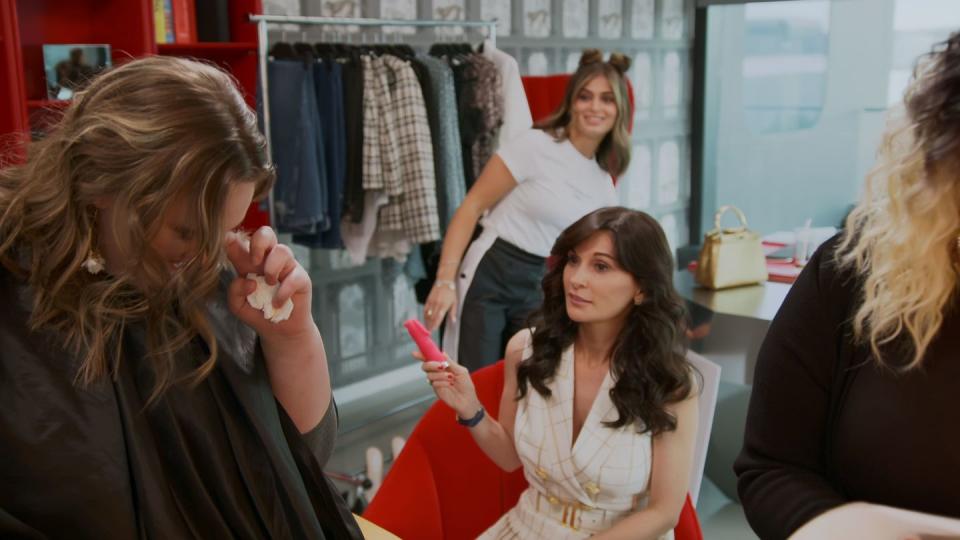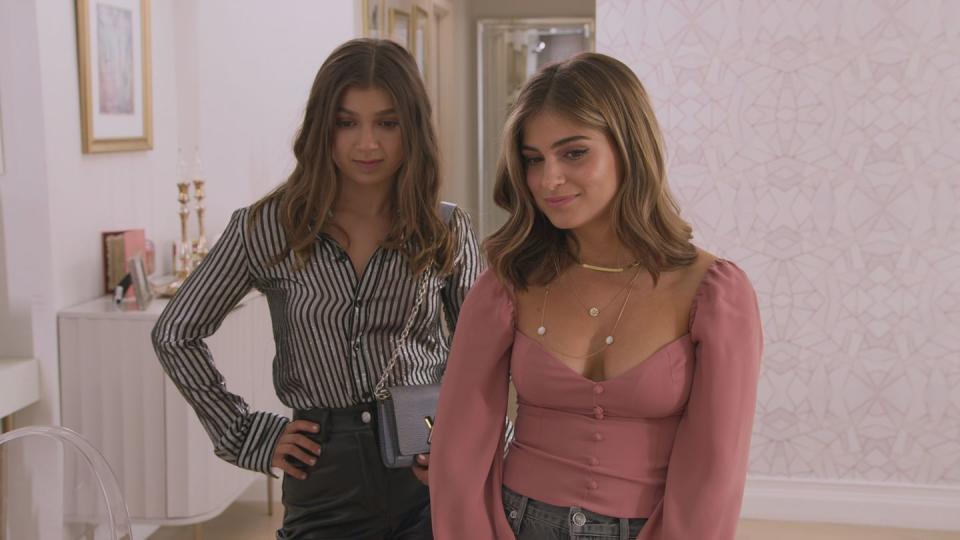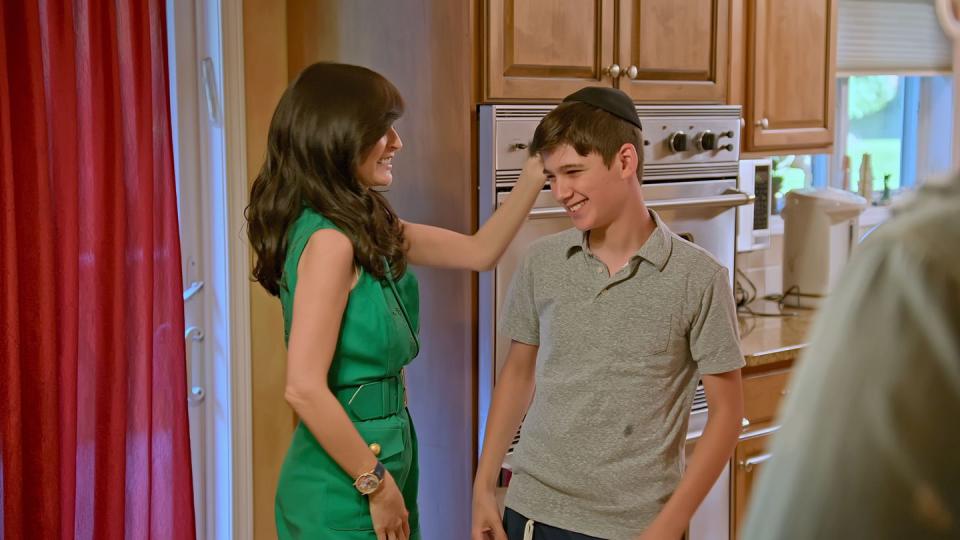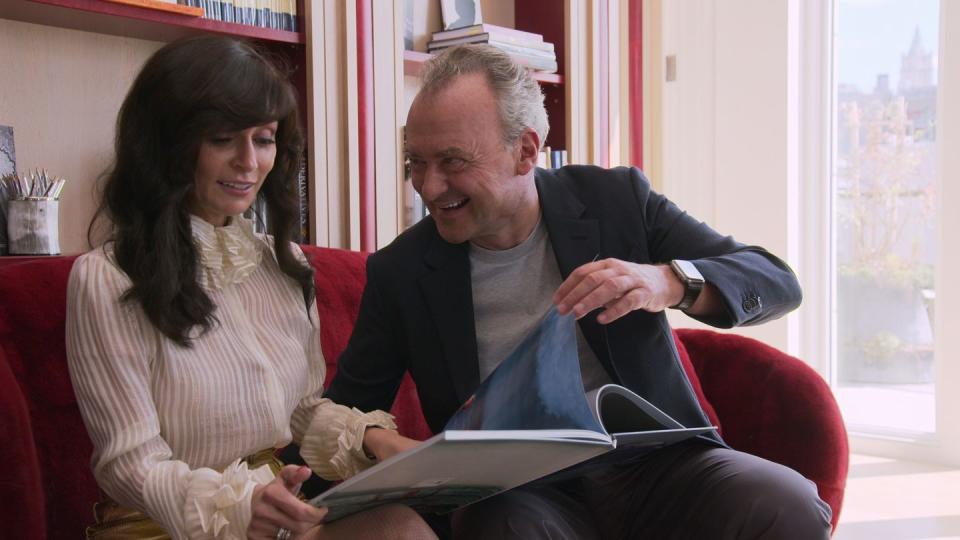"My Unorthodox Life's" Julia Haart Says "Sex and the City" Set Her Free

- Oops!Something went wrong.Please try again later.
“Hearst Magazines and Verizon Media may earn commission or revenue on some items through the links below.”
Julia Haart is the CEO and co-owner of Elite World Group, the largest modeling network. Before that, as the creative director of the lingerie brand La Perla, Haart designed Kendall Jenner's 2017 Met Gala dress, featuring 85,000 crystals on a single string. She also created and sold a high heel shoe brand.
And eight years ago, Julia Haart didn't exist.
Until 2012, she was Talia Hendler, a mother-of-four living in a cloistered community of ultra-Orthodox Jews in Monsey, New York. "I divide my life into two pieces. The first 42 years of my life is what was done to me. The last eight years is what I got," Haart tells Oprah Daily. Her last name, Haart, is an English translation of her maiden name. "This was a phoenix rising from the ashes. So I figured, if I'm reinventing myself, I'm reinventing my name," she says.
In the Netflix show My Unorthodox Life, Haart opens up about the chapter she hadn't been ready to share previously. Her forthcoming memoir, Brazen, will go into greater detail—she called writing the first draft, which was over 1,000 pages, a "cathartic" experience.
Haart grew up in a Haredi community, where she says she was taught to dress modestly, become a "baby-making machine," and prioritize men's happiness over her own (think Netflix's Unorthodox, also based on a true story). "My whole life I was told, 'A woman's mind is light. She's not capable of grasping deep subjects.' Do you know what that does to your psyche, when you're literally being told every day that you're less than, and men are praying that they're lucky not to be you?" she says.
Before leaving the ultra-Orthodox community in 2012, Haart worked as a teacher and sold insurance part-time. Meanwhile, she was preparing for a future life in fashion: While in the community, Haart developed the concept of her namesake shoe brand, which she launched two months after leaving.
Haart set out to create high heels that were both flattering and comfortable. To do so, she altered the typical arch to create a more ergonomic design, one that distributed pressure points across the entire foot, not only the front. "When I came to La Perla, it was the same thing, eradicating this concept of suffering for beauty. This whole, no pain, no gain—I'm sorry, men don't say that," she says. "Let's liberate women from uncomfortable clothing, from feeling confined, and that they can't move or breathe."
Haart says a string of "crazy random miracles" helped launch her career. "I met the production guy on an airplane, I sat next to the guy who ended up producing my shoes," Haart says, as an example. Then, a La Perla board member heard a colleague discuss how comfortable Haart's shoes were, and thought to bring her in for an interview about the creative director role. Once at La Perla, she met her now-husband, Silvio Scaglia (who currently goes by Silvio Scaglia Haart), who was La Perla's CEO. Silvio later encouraged her to take over for Elite, which he owns.
For all its glimpses into the fashion world, Haart's family is at the center of the 9-episode show. She had four children with her ex-husband, Yosef Hendler, whom she married at the age of 19 in an arranged ceremony. Her eldest, Batsheva, is a TikTok influencer, and married her husband, Binyamin Weinstein, at 19. Shlomo, Haart's second child, is a Columbia grad on his way to law school. Miriam, her third child, is software engineering student who taught a class at Stanford as a freshman. Whereas the eldest three have left the ultra-Orthodox community and live in New York, at 14, Aron still straddles worlds, shuttling between his father's house in Monsey and his mom's NYC penthouse.
In the show, all four negotiate their relationship with religion and their mother's decision to leave the community they were raised in. "It is very emotional. Think about it, you are literally ripping yourself away from everyone and everything you know, and moving yourself 400 years into the future," she explains. Though she no longer considers herself religious, Haart gives her kids space to navigate their Judaism. "I have nothing against any religion. My only fight has been with fundamentalism," she says.
Below, we spoke to Haart about her life then and her life today, which she calls a miracle.

Why are you ready to share your story now?
The word "ready" is a really good nuance, because the reality is that until I became creative director of La Perla, I didn't tell a single soul my story. No one. My husband knew me for probably two years before I told him one word about my past, and even after I told close friends. As you see, there's no press about it anywhere, I never spoke about it.
The reason for that is that I wasn't strong enough yet. I wanted to accomplish something. I wanted people to see what I have inside of me. Only then, when I felt that little accomplishment, did I feel strong enough and safe enough to tell my story. I hope I can help women say, "Well, hey, if this crazy woman did this, at 43, knowing no one, and being completely ignorant, then whatever my thing in my life that I long for, that everyone has told me I can't have, I'm going to go after it."
This isn't only your story—your family is involved. What were the conversations about the show like?
It's really funny that you ask that. My kids, they were so gung-ho, I couldn't believe it. Their life wasn't as extremist as mine, because as I started questioning things, I loosened my grasp on that stranglehold of isolation. Their upbringing was different than mine in the sense that they had me as a parent.
Batsheva was brought up the most fundamentalist because she was my eldest. I tell this story all the time now. Once, one of her babysitters had put on a radio with the news. Not only did I fire the nanny, I cried for two days, because I was sure I had ruined my daughter's soul, 100% convinced that God was going to punish me, and that me and my daughter were going to hell for eternity because there was a radio on in my house. That's how crazy I was.

Have you heard from people within your former community?
Some people in the community never stopped talking to me. Three of my closest friends have supported me from day one, even though they didn't understand what I was doing and they thought I was crazy, they were like, "Julia, we think you're crazy, but we love you anyway." Mostly everyone else dropped me like a hot potato.
One of the people who I hadn't spoken to in probably over eight years called me yesterday. She said that they have these Jewish get-togethers where the ladies come together and talk about a book. This week, they were talking about the [Netflix] show.
She told me about was this woman in Jewish world named Sarah Schenirer. She was around in the 1900s, and she is the woman who forced my fundamentalist, extreme ultra-Orthodox community to open schools to women, because until then there were no schools for women. Sarah said, "I love being a Jew. I have nothing against the Torah, I don't have anything against God. This is wrong. This piece needs to change."
People were saying in this talk group, "Julia's trying to do the same thing. She doesn't hate being Jewish. She doesn't hate any of us. She loves being a Jew, she loves the people in the community. She's trying to force change for us." I burst out crying, because that's exactly what I'm doing, or trying to do. If that helps in any way, it's all worth it.
Is this the future you imagined for yourself?
My life is a miracle. I didn't imagine anything when I left. I only knew that if I didn't leave, I wouldn't survive. I had been able to contain my misery for a very long time. But the year before I left, it was so bad that it was literally oozing out of my pores, and I couldn't bear it anymore.
I decided that I was going to kill myself, and I spent months trying to figure out what the best method to commit suicide would be that wouldn't harm my children's chances of finding spouses. In my community, suicide is not okay. I knew that if I would commit suicide, my children would never get married in that community.
At that point, still, it hadn't occurred to me that all that kind of life was wrong. I just thought, I'm just messed up that I'm not happy with it, that it's not enough for me. I thought something was inherently and innately wrong with me.
I decided that the easiest and the safest way to kill myself would be to starve myself to death, because then people would think I just had an eating disorder. That doesn't have as bad a reputation or a stigma as committing suicide. By the time I left, I was 73 pounds. I was a skeleton, literally a skeleton. It's scary. I have pictures of me from the few weeks before I left.

Why did you leave?
I always say this: My daughter Miriam saved my life. If it wasn't for her, I would never, ever have managed to get out. They were torturing her and I couldn't bear it. She just refused to conform and they just kept pushing, and I realized that one day she will break.
I think about it. She's 21 years old, she's a junior in Stanford University. She is dating this incredible, fabulous woman. And this kid would be on baby number two and making Shabbas dinners in upstate New York had I not left.
It makes me wonder about what your life would have been like if you'd left earlier.
I say that all the time. People say, "Oh, but maybe what you went through formed you." Or maybe this is who I've been all my life, and I just wasn't allowed to show it. Had I left 20 years earlier, who knows where I'd be today? That's the worst part of it.
How has your marriage been part of your journey?
We are very independent, strong-willed people, and he loves my independence, so to me, before, marriage was a prison. So, now I realize that you can be married, you can love someone, and you can still have your own freedom and individuality, and I think that's beautiful. I love love.

You're really open with your kids in the show, especially about sex.
Well, there's two pieces. Number one is, even at my most fundamentalist, when my children asked a question, I never lied. I always assumed that if they're old enough to ask, they're old enough to receive a proper answer.
In terms of sex, I had my first orgasm in my late 30s when I watched Sex and the City, and it was the first time I ever heard of a vibrator. I literally went into a sex shop, all covered—I'm talking stockings, socks on top of my stockings, sheitel wig on my head, collar covered, elbows covered, knees, the whole nine yards. I looked like probably the world's most stodgy-looking librarian or something, and I went in and I bought myself a vibrator and I had my first orgasm. I didn't know that sex could be pleasant. So, when I left the community, it was freedom literally.
How would you describe yourself, and how would your kids describe you?
I like brazen, like the name of my book. I hope I am just full of chutzpah. My kids talk about me on their Instagram posts. They have a lot of respect for me, I think, and they see that if you work crazy hard and you go for something, you will succeed.
You Might Also Like

